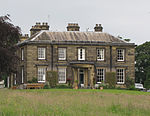Society of Glass Technology
Engineering societies based in the United KingdomGlass engineering and scienceOrganisations based in SheffieldOrganizations established in 1916
The Society of Glass Technology (SGT) is an organisation for individuals and organizations with a professional interest in glass manufacture and usage. The Society is based in the United Kingdom, with its offices in Sheffield, South Yorkshire, England, but it has a worldwide membership. The objects of the Society "are to encourage and advance the study of the history, art, science, design, manufacture, after treatment, distribution and end use of glass of any and every kind".The Society was founded by W. E. S. Turner in 1916.The Society is a founder member of the International Commission on Glass and the European Society of Glass Science and Technology.
Excerpt from the Wikipedia article Society of Glass Technology (License: CC BY-SA 3.0, Authors).Society of Glass Technology
Churchill Way, Sheffield Ecclesfield
Geographical coordinates (GPS) Address Nearby Places Show on map
Geographical coordinates (GPS)
| Latitude | Longitude |
|---|---|
| N 53.47414 ° | E -1.47405 ° |
Address
Churchill Way
S35 2PS Sheffield, Ecclesfield
England, United Kingdom
Open on Google Maps










